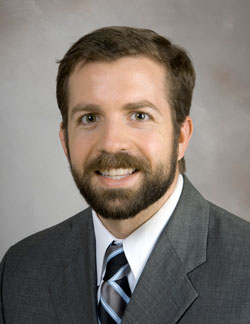Researchers receive $2.3M grant to study environmental influences on children’s health

Thomas Northrup, PhD, associate professor in the Department of Family and Community Medicine, and Kristina Whitworth, PhD, and Elaine Symanski, PhD, at Baylor College of Medicine, received funding from the National Institutes of Health as part of the Environmental influences on Child Health Outcomes (ECHO) Program to recruit a cohort of pregnant people in Houston with the ultimate goal of following their children through age 21 years.
The ECHO Program is interested in chemical and physical, lifestyle and psychosocial exposures experienced by pregnant people and by children in the first five years of life. Researchers will collect data on how these exposures impact children with an emphasis on key pediatric outcomes including pre-, peri- and postnatal health, neurodevelopment, respiratory health, obesity and positive health.
“Pregnancy is a highly vulnerable period,” said Symanski, co-principal investigator and professor in the Center for Precision Environmental Health and the Margaret M. and Albert B. Alkek Department of Medicine at Baylor. “Exposures during pregnancy not only impact pregnant people’s long-term health, but also the health trajectory of their infant throughout childhood.”
The Houston team will receive $2.3 million over two years to recruit participants and gather health data, with an opportunity for a second five-year phase of the study with additional funding for a total of up to $10.6 million. The ECHO Program relies on data collected under a unifying protocol from cohort sites across the United States to conduct national analyses and maximize power to answer questions about the complex interplay of different exposures on child health.
As part of the ECHO cohort, data are collected at both the individual and neighborhood level, to get a broader understanding of how the environment shapes population health. Until now, pregnant people and children in Houston, the fourth largest and most diverse city in the nation, have been underrepresented in ECHO.
“Houston provides a nexus for environmental health research,” said Whitworth, co-principal investigator and associate professor in the Center for Precision Environmental Health and the Margaret M. and Albert B. Alkek Department of Medicine at Baylor. “We believe that the inclusion of racially, ethnically and socioeconomically diverse women and children from the greater Houston area will strengthen the ability of ECHO to address important questions related to disparities in children’s environmental health.” For example, investigators hope the ECHO program will provide insight into how structural racism and discrimination impacts pregnancy and therefore child health, potentially by amplifying the adverse impacts of chemical exposures.
The research will build on the work of Baylor’s Program in Population and Environmental Health Disparities and existing collaborations with ECHO co-investigator, Hector Mendez-Figueroa, MD, associate professor in the Department of Obstetrics, Gynecology, and Reproductive Sciences, who also serves as PI of a recruitment site for the Maternal and Infant Environmental Health Riskscape (MIEHR) Research Center. Recruitment for the Houston-based ECHO cohort site will occur at the UT Physicians Women’s Centers and will be led by Northrup, co-principal investigator and associate professor in the Department of Family and Community Medicine and Center for Clinical Research and Evidence-Based Medicine.
“UTHealth has a long, productive history of clinical research in pregnant, postpartum, neonatal, and pediatric populations,” Northrup said. McGovern Medical School is the only institution in Texas to be funded as part of both the National Institute of Child Health and Human Development (NICHD) Maternal-Fetal Medicine Units Network and the NICHD Neonatal Research Network.
Northrup added, “Furthering this work and building on existing and highly successful collaborations with Baylor capitalizes on the strengths of our two institutions to improve children’s environmental health. I am thrilled to co-lead this project with Drs. Whitworth and Symanski.”
Other co-investigators include Jon Tyson, MD, MPH; Ricardo Mosquera, MD; and Dinorah Zanger, PhD; in the Department of Pediatrics at McGovern Medical School, Wenyaw Chan, PhD; in the Department of Biostatistics and Data Science at UTHealth Houston School of Public Health, and Cheryl Walker, PhD; in the Center for Precision Environmental Health at Baylor.